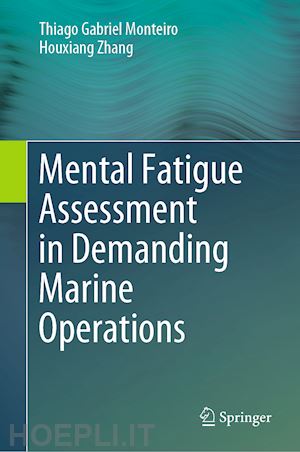
Questo prodotto usufruisce delle SPEDIZIONI GRATIS
selezionando l'opzione Corriere Veloce in fase di ordine.
Pagabile anche con Carta della cultura giovani e del merito, 18App Bonus Cultura e Carta del Docente
This book investigates how human mental fatigue (MF) can be objectively measured during demanding maritime operations. The maritime domain is characterized by demanding operations. These operations can be especially complex and dangerous when they require coordination between different maritime vessels and several maritime operators. The best approach to quantify MF is through the use of physiological sensors including electroencephalogram (EEG), electrocardiogram, electromyogram, temperature sensor, and eye tracker can be applied, individually or in conjunction, in order to collect relevant data that can be mapped to an MF scale. More than simpler sensor fusion, this book bridges the gap between relevant sensor data and a quantifiable MF level using both data-driven and model-based approaches.
Data-driven part investigates the use of different NNs combined for the MF assessment (MFA) task. Among the different architectures tested, convolutional neural networks (CNN) showed the best performance when dealing with multiple physiological data channels. Optimization was used to improve the performance of CNN in the cross-subject MFA task. Testing different combinations of physiological sensors indicated a setup consisting of EEG sensor only was the best option, due to the trade-off between assessment precision and sensor framework complexity. These two factors are of great importance when considering an MFA system that could be implemented in real-life scenarios. The model-based discussion applies the current knowledge about the use of EEG data to characterize MF to develop an MF approach to quantify the progression of MF in maritime operators.
In the research presented in this book, realistic vessel simulators were used as a platform for experimenting with different operational scenarios and sensor setups.
Preface.- Introduction.- Handling Fatigue.- Mental Fatigue Assessment Sensor Framework.- Mental Fatigue Assessment Using Artificial Intelligence.- Model-based Assessment for Multi-subject and Multi-task Scenarios.- Mental Fatigue Prediction.- Research Challenges.
Thiago Gabriel Monteiro received B.Sc. degree in naval architecture and maritime engineering from the University of São Paulo, Brazil, in 2013 and M.Sc. degree in Ship Design from the Norwegian University of Science and Technology (NTNU), Norway, in 2016. He worked as a member of the Ship Design and Operations Laboratory, NTNU Ålesund, from 2014 to 2016. He was also a collaborator in the SFI MOVE project, from 2017 to 2020. From 2017 to 2021, he worked in the Intelligent Systems lab as a Ph.D. candidate. He received his Ph.D. degree in Engineering from NTNU in 2021 in the field of physiological sensor fusion in the maritime domain. He currently works as a software engineer at Dipai AS.
Houxiang Zhang is a full professor and director of Intelligent Systems Laboratory at the Department of Ocean Operations and Civil Engineering, Faculty of Engineering, Norwegian University of Science and Technology. He received his Ph.D. degree on Mechanical and Electronic Engineering in 2003. From 2004, he worked as a postdoctoral fellow and senior researcher at the Institute of Technical Aspects of Multimodal Systems (TAMS), Department of Informatics, Faculty of Mathematics, Informatics, and Natural Sciences, University of Hamburg, Germany. In Feb. 2011, he finished the Habilitation on Informatics at the University of Hamburg. Dr. Zhang joined the NTNU, Norway, in April 2011 where he is a full professor on Mechatronics. From 2011 to 2016, Dr. Zhang also hold a Norwegian national GIFT Professorship on product and system design funded by Norwegian Maritime Centre of Expertise. He was nominated and selected as a member of the Norwegian Academy of Technological Sciences in 2019, and a member of Academy of the Royal Norwegian Society of Sciences and Letters in 2024.











Il sito utilizza cookie ed altri strumenti di tracciamento che raccolgono informazioni dal dispositivo dell’utente. Oltre ai cookie tecnici ed analitici aggregati, strettamente necessari per il funzionamento di questo sito web, previo consenso dell’utente possono essere installati cookie di profilazione e marketing e cookie dei social media. Cliccando su “Accetto tutti i cookie” saranno attivate tutte le categorie di cookie. Per accettare solo deterninate categorie di cookie, cliccare invece su “Impostazioni cookie”. Chiudendo il banner o continuando a navigare saranno installati solo cookie tecnici. Per maggiori dettagli, consultare la Cookie Policy.